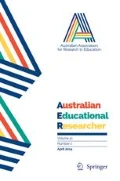Abstract
Reasoning about social inclusion is at the very heart of what it means for children to engage in active citizenship. In this paper, we focus on collaborative argumentation as a core approach to reasoning about social inclusion for active citizenship. We engaged a group of Australian primary school teachers in a social lab conversation, informed by reflexivity theory, to explore their ideas about, and experiences with, supporting children to reason about social inclusion. Teachers overwhelmingly identified a range of personal and cultural emergent conditions that enabled children’s reasoning for social inclusion. Across these enabling emergent properties, an evaluativist view of the nature of knowledge and ways of knowing emerged with respect to teaching social reasoning. These findings suggest that it may be important to pay attention to teachers’ reflexive deliberations about epistemic stances and their view of what enables and constrains such reasoning.
We’re sorry, something doesn't seem to be working properly.
Please try refreshing the page. If that doesn't work, please contact support so we can address the problem.
Notes
C2C—Curriculum into the Classroom (Education Queensland curriculum documents); NAPLAN—Australia’s National Assessment Program – Literacy and Numeracy.
References
Archer, M. (2012). The reflexive imperative in late modernity. Cambridge University Press.
Barzilai, S., & Chinn, C. (2018). On the goals of epistemic education: Promoting apt epistemic performance. Journal of the Learning Sciences, 27, 353–389. https://doi.org/10.1080/10508406.2017.1392968.
Chinn, C. A., & Clark, D. B. (2013). Learning through collaborative argumentation. In C. E. Hmelo-Silver (Ed.). International handbook of collaborative learning (pp. 314–332). Routledge.
Chinn, C. A., Duncan, R. G., & Rinehart, R. W. (2018). Epistemic design: Design to promote transferable epistemic growth in the PRACCIS project. In E. Manalo, Y. Uesaka, & C. A. Chinn (Eds.), Promoting spontaneous use of learning and reasoning strategies: Theory, research, and practice for effective transfer (pp. 242–259). Routledge.
Hassan, Z. (2014). The Social Labs Revolution: A new approach to solving our most complex challenges. Berrett-Koehler Publishers, Inc.
Lunn Brownlee, J., Johansson, E., Walker, S., & Scholes, L. (2017). Teaching for active citizenship: Personal epistemology and practices in early education classrooms. Routledge.
McKenzie, F. (2015). The system shift initiative. Sydney: Australian Futures Project.
Moshman, D. (2015). Epistemic cognition and development: Tthe psychology of truth and justification. Psychology Press.
Reznitskaya, A., & Wilkinson, I. (2017). The most reasonable answer. Helping students build better arguments together: Harvard Education Press.
Ryan, M., Bourke, T., Lunn, J., Rowan, L., Walker, S., & Churchward, P. (2019). Seeking a reflexive space for teaching to and about diversity: Emergent properties of enablement and constraint for teacher educators. Teachers and Teaching: Theory and Practice, 25(2), 259–273. https://doi.org/10.1080/13540602.2018.1542298.
Ryan, M., & Carmichael, M. A. (2015). Shaping (reflexive) professional identities across an undergraduate degree program: A longitudinal case study. Teaching in Higher Education, 21(2), 151–165. https://doi.org/10.1080/13562517.2015.1122586.
Ryu, S., & Sandoval, W. (2012). Improvements to elementary children’s epistemic understanding from sustained argumentation. Science Education, 96(3), 488–526. https://doi.org/10.1002/sce.21006.
Scholes, L., Lunn, J., Walker, S., Johansson, E., Lawson, V., & Mascadri, J. (2017). Promoting social inclusion in the early years of elementary school: a focus on children's epistemic beliefs for moral reasoning. International Journal of Inclusive Education, 21(5), 507–520.
Sigauke, A. T. (2011). Citizenship and citizenship education: a critical discourse analysis of the Zimbabwe Presidential Commission Report. Education, Citizenship and Social Justice, 6(1), 69–86.
Timmerans, J., Blok, V., Braun, R., Wesselink, R., & Ojvind Nielsen, R. (2020). Social labs as an inclusive methodology to implement and study social change: the case of responsible research and innovation. Journal of Responsible Innovation. https://doi.org/10.1080/23299460.2020.1787751.
Walker, C. M., Wartenberg, T. E., & Winner, E. (2013). Engagement in philosophical dialogue facilitates children’s reasoning about subjectivity. Developmental Psychology, 49(7), 1338–1347. https://doi.org/10.1037/a0029870.
Walton, D. (1998). The new dialectic: Cconversational contexts of argument. University of Toronto Press. http://www.jstor.org.ezp01.library.qut.edu.au/stable/10.3138/9781442681859
Weinstock, M. (2016). Epistemic cognition in legal reasoning. In J. A, Greene, W. A. Sandoval, & I. Bråten (Eds.), Handbook of epistemic cognition (pp. 215–229). Routledge.
Westheimer, J., & Kahne, J. (2004). What kind of citizen? The politics of educating for democracy. American Educational Research Journal, 41(2), 237–269. https://doi.org/10.3102/00028312041002237.
Willis, J., Crosswell, L., Morrison, C., Ryan, M., & Gibson, A. (2017). Looking for leadership: The potential of dialogic reflexivity with rural early career teachers. Teachers and Teaching: Theory and Practice, 23(7), 794–809. https://doi.org/10.1080/13540602.2017.1287695.
Author information
Authors and Affiliations
Corresponding author
Additional information
Publisher's Note
Springer Nature remains neutral with regard to jurisdictional claims in published maps and institutional affiliations.
Rights and permissions
About this article
Cite this article
Brownlee, J.L., Bourke, T., Walker, S. et al. What influences teachers’ support for children’s reasoning about social inclusion in primary school education classrooms?. Aust. Educ. Res. 49, 155–173 (2022). https://doi.org/10.1007/s13384-021-00434-y
Received:
Accepted:
Published:
Issue Date:
DOI: https://doi.org/10.1007/s13384-021-00434-y

